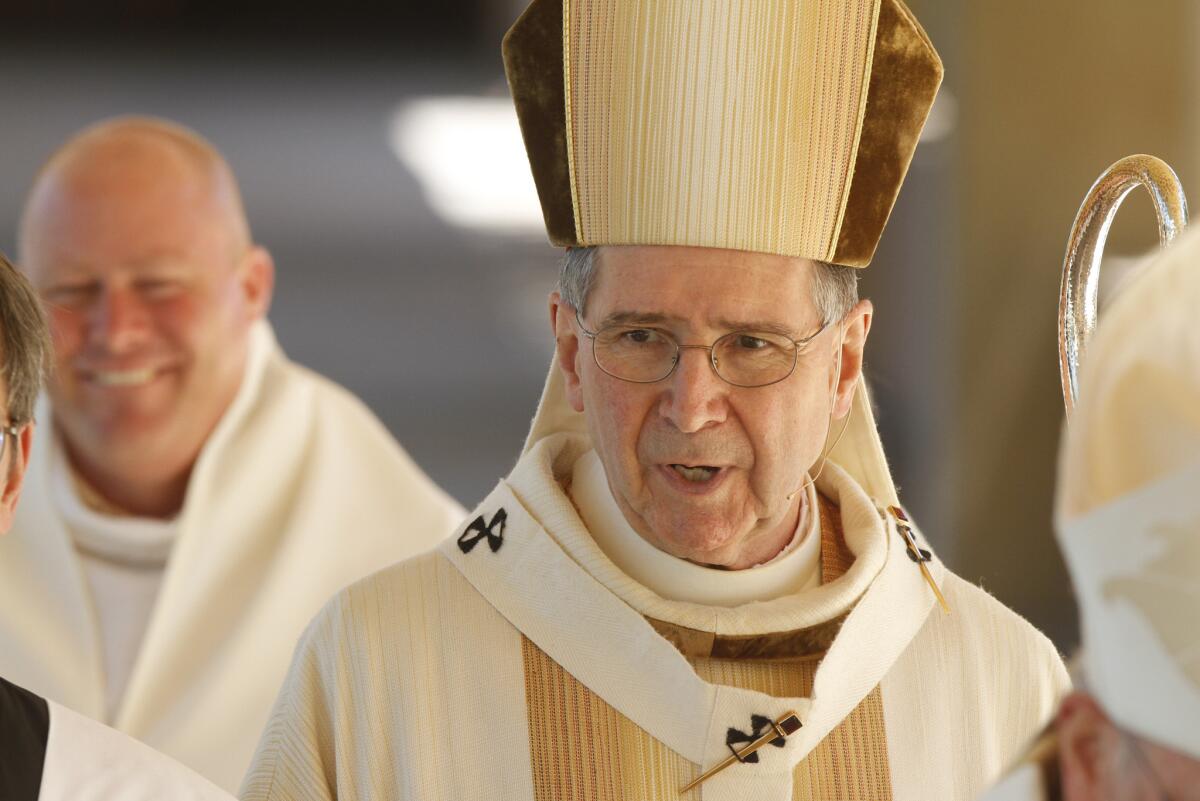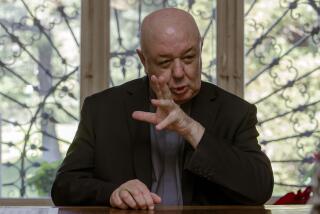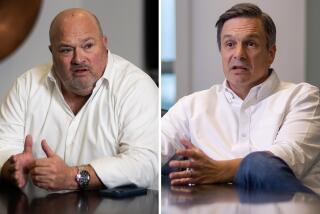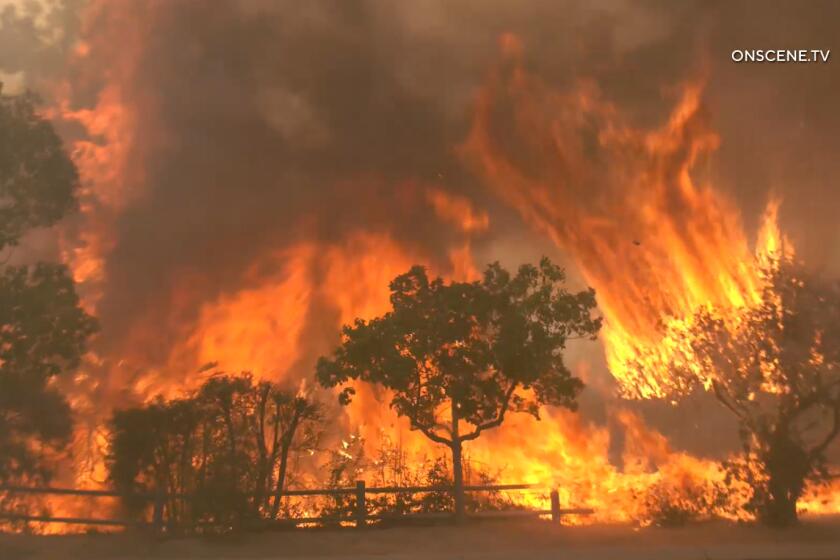L.A. church leaders sought to hide sex abuse cases from authorities

Fifteen years before the clergy sex abuse scandal came to light, Archbishop Roger M. Mahony and a top advisor plotted to conceal child molestation by priests from law enforcement, including keeping them out of California to avoid prosecution, according to internal Catholic church records released Monday.
The archdiocese’s failure to purge pedophile clergy and reluctance to cooperate with law enforcement has previously been known. But the memos written in 1986 and 1987 by Mahony and Msgr. Thomas J. Curry, then the archdiocese’s chief advisor on sex abuse cases, offer the strongest evidence yet of a concerted effort by officials in the nation’s largest Catholic diocese to shield abusers from police. The newly released records, which the archdiocese fought for years to keep secret, reveal in church leaders’ own words a desire to keep authorities from discovering that children were being molested.
In the confidential letters, filed this month as evidence in a civil court case, Curry proposed strategies to prevent police from investigating three priests who had admitted to church officials that they abused young boys. Curry suggested to Mahony that they prevent them from seeing therapists who might alert authorities and that they give the priests out-of-state assignments to avoid criminal investigators.
One such case that has previously received little attention is that of Msgr. Peter Garcia, who admitted preying for decades on undocumented children in predominantly Spanish-speaking parishes. After Garcia’s discharge from a New Mexico treatment center for pedophile clergy, Mahony ordered him to stay away from California “for the foreseeable future” in order to avoid legal accountability, the files show. “I believe that if Monsignor Garcia were to reappear here within the archdiocese we might very well have some type of legal action filed in both the criminal and civil sectors,” the archbishop wrote to the treatment center’s director in July 1986.
The following year, in a letter to Mahony about bringing Garcia back to work in the archdiocese, Curry said he was worried that victims in Los Angeles might see the priest and call police.
“[T]here are numerous — maybe twenty — adolescents or young adults that Peter was involved with in a first degree felony manner. The possibility of one of these seeing him is simply too great,” Curry wrote in May 1987.
Garcia returned to the Los Angeles area later that year; the archdiocese did not give him a ministerial assignment because he refused to take medication to suppress his sexual urges. He left the priesthood in 1989, according to the church.
Garcia was never prosecuted and died in 2009. The files show he admitted to a therapist that he had sexually abused boys “on and off”since his 1966 ordination. He assured church officials his victims were unlikely to come forward because of their immigration status. In at least one case, according to a church memo, he threatened to have a boy he had raped deported if he went to police.
The memos are from personnel files for 14 priests submitted to a judge on behalf of a man who claims he was abused by one of the priests, Father Nicholas Aguilar Rivera. The man’s attorney, Anthony De Marco, wrote in court papers the files show “a practice of thwarting law enforcement investigations” by the archdiocese. It’s not always clear from the records whether the church followed through on all its discussions about eluding police, but in some cases, such as Garcia’s, it did.
Mahony, who retired in 2011, has apologized repeatedly for errors in handling abuse allegations. In a statement Monday, he apologized once again and recounted meetings he’s had with about 90 victims of abuse.
“I have a 3 x 5 card for every victim I met with on the altar of my small chapel. I pray for them every single day,” he wrote. “As I thumb through those cards I often pause as I am reminded of each personal story and the anguish that accompanies that life story.”
“It remains my daily and fervent prayer that God’s grace will flood the heart and soul of each victim, and that their life-journey continues forward with ever greater healing,” he added. “I am sorry.”
Curry did not return calls seeking comment. He currently serves as the archdiocese’s auxiliary bishop for Santa Barbara.
The confidential files of at least 75 more accused abusers are slated to become public in coming weeks under the terms of a 2007 civil settlement with more than 500 victims. A private mediator had ordered the names of the church hierarchy redacted from those documents, but after objections from The Times and the Associated Press, a Superior Court judge ruled that the names of Mahony, Curry and others in supervisory roles should not be blacked out.
Garcia’s was one of three cases in 1987 in which top church officials discussed ways they could stymie law enforcement. In a letter about Father Michael Wempe, who had acknowledged using a 12-year-old parishioner as what a church official called his “sex partner,” Curry recounted extensive conversations with the priest about potential criminal prosecution.
“He is afraid ... records will be sought by the courts at some time and that they could convict him,” Curry wrote to Mahony. “He is very aware that what he did comes within the scope of criminal law.”
Curry proposed Wempe could go to an out-of-state diocese “if need be.” He called it “surprising” that a church-paid counselor hadn’t reported Wempe to police and wrote that he and Wempe “agreed it would be better if Mike did not return to him.”
Perhaps, Curry added, the priest could be sent to “a lawyer who is also a psychiatrist” thereby putting “the reports under the protection of privilege.”
Curry expressed similar concerns to Mahony about Father Michael Baker, who had admitted his abuse of young boys during a private 1986 meeting with the archbishop.
In a memo about Baker’s return to ministry, Curry wrote, “I see a difficulty here, in that if he were to mention his problem with child abuse it would put the therapist in the position of having to report him … he cannot mention his past problem.”
Mahony’s response to the memo was handwritten across the bottom of the page: “Sounds good —please proceed!!” Two decades would pass before authorities gathered enough information to convict Baker and Wempe of abusing boys.
Federal and state prosecutors have investigated possible conspiracy cases against the archdiocese hierarchy. Former Dist. Atty. Steve Cooley said in 2007 that his probe into the conduct of high-ranking church officials was on hold until his prosecutors could access the personnel files of all the abusers. The U.S. attorney’s office convened a grand jury in 2009, but no charges resulted.
During those investigations, the church was forced by judges to turn over some but not all of the records to prosecutors. The district attorney’s office has said its prosecutors plan to review priest personnel files as they are released.
Mahony was appointed archbishop in 1985 after five years leading the Stockton diocese. While there, he had dealt with three allegations of clergy abuse, including one case in which he personally reported the priest to police.
In Los Angeles, he tapped Curry, an Irish-born priest, as vicar of clergy. The records show that sex abuse allegations were handled almost exclusively by the archbishop and his vicar. Memos that crossed their desks included graphic details, such as one letter from another priest accusing Garcia of tying up and raping a young boy in Lancaster.
Mahony personally phoned the priests’ therapists about their progress, wrote the priests encouraging letters and dispatched Curry to visit them at a New Mexico facility, Servants of the Paraclete, that treated pedophile priests.
“Each of you there at Jemez Springs is very much in my prayers and I call you to mind each day during my celebration of the Eucharist,”Mahony wrote to Wempe.
The month after he was named archbishop, Mahony met with Garcia to discuss his molestation of boys, according to a letter the priest wrote while in therapy. Mahony instructed him to be “very low key” and assured him “no one was looking at him for any criminal action,” Garcia recalled in a letter to an official at Servants of the Paraclete.
In a statement Monday on behalf of the archdiocese, a lawyer for the church said its policy in the late 1980s was to let victims and their families decide whether to go to the police.
“Not surprisingly, the families of victims frequently did not wish to report to police and have their child become the center of a public prosecution,” lawyer J. Michael Hennigan wrote.
He acknowledged memos written in those years “sometimes focused more on the needs of the perpetrator than on the serious harm that had been done to the victims.”
“That is part of the past,” Hennigan wrote. “We are embarrassed and at times ashamed by parts of the past. But we are proud of our progress, which is continuing.”
Hennigan said that the years in which Mahony dealt with Garcia were “a period of deepening understanding of the nature of the problem of sex abuse both here and in our society in general” and that the archdiocese subsequently changed completely its approach to reports of abuse.
“We now have retired FBI agents who thoroughly investigate every allegation, even anonymous calls. We aggressively assist in the criminal prosecution of offenders,” Hennigan wrote.
Mahony and Curry have been questioned under oath in depositions numerous times about their handling of molestation cases. The men, however, have never been asked about attempts to stymie law enforcement, because the personnel files documenting those discussions were only provided to civil attorneys in recent months. De Marco, the lawyer who filed the records in civil court this month, asked a judge last week to order Curry and Mahony to submit to new depositions “regarding their actions, knowledge and intent as referenced in these files.” A hearing on that request is set for February.
In a 2010 deposition, Mahony acknowledged the archdiocese had never called police to report sexual abuse by a priest before 2000. He said church officials were unable to do so because they didn’t know the names of the children harmed.
“In my experience, you can only call the police when you’ve got victims you can talk to,” Mahony said.
When an attorney for an alleged victim suggested “the right thing to do” would have been to summon police immediately, Mahony replied, “Well, today it would. But back then that isn’t the way those matters were approached.”
Since clergy weren’t legally required to report suspected child abuse until 1997, Mahony said, the people who should have alerted police about pedophiles like Baker and Wempe were victims’ therapists or other “mandatory reporters” of child abuse.
“Psychologists, counselors … they were also the first ones to learn [of abuse] so they were normally the ones who made the reports,” he said.
In Garcia’s 451-page personnel file, one voice decried the church’s failures to protect the victims and condemned the priest as someone who deserved to be behind bars. Father Arturo Gomez, an associate pastor at a predominantly Spanish-speaking church near Olvera Street, wrote to a regional bishop in 1989, saying he was “angry” and “disappointed” at the church’s failure to help Garcia’s victims. He expressed shock that the bishop, Juan A. Arzube, had told the family of two of the boys that Garcia had thought of taking his own life.
“You seemed to be at that moment more concern[ed] for the criminal rather than the victum! (sic)” Gomez wrote to Arzube in 1989.
Gomez urged church leaders to identify others who may have been harmed by Garcia and to get them help, but was told they didn’t know how.
“If I was the father … Peter Garcia would be in prison now; and I would probably have begun a lawsuit against the archdiocese,” the priest wrote in the letter. “The parents … of the two boys are more forgiving and compassionate than I would be.”
victoria.kim@latimes.com
ashley.powers@latimes.com
harriet.ryan@latimes.com
More to Read
Sign up for Essential California
The most important California stories and recommendations in your inbox every morning.
You may occasionally receive promotional content from the Los Angeles Times.








